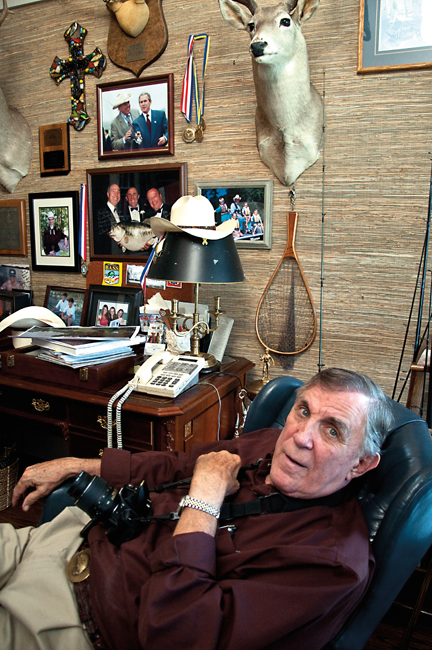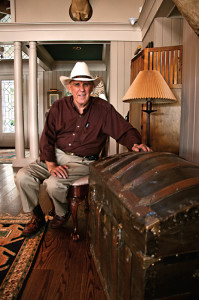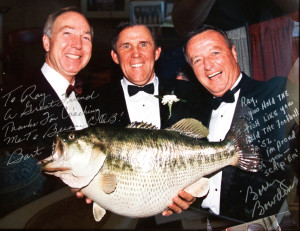Of Bass and Bucks
Posted on November 2, 2013 by bob in Features

Scott (in cowboy hat) and friends forego bass fishing at one of his Pintlala lakes to relax at the dock with poles and crickets, landing a hefty stringer of large bream and tilapia.
by Niko Corley; photos by Bob Corley
It’s been said that sales requires a bit of arithmetic, where product plus timing plus pitch equals success. If so, then self-described “loudmouthed bass fisherman” Ray Scott and the fishing and hunting companies he’s built over his lifetime are shining examples.
From the Bass Anglers Sportsmans’ Society (BASS), to the Whitetail Institute, to dozens of spin-off products and companies along the way, Scott is a visionary. We all have ideas, but figuring out how to capitalize on the good ones is what differentiates entrepreneurs like Scott from the rest of us.
Before his outdoor activity-based ideas took flight, Scott was a life insurance salesman, and a good one.

The walls of Scott’s office are lined with awards, trophies, and photos of celebrities, sportsmen, and presidents.
Once while working out of state, he took a break from making sales calls to visit a nearby lake said to be a top fishing locale. After a cold, rainy, fruitless day on the water, he retired to his motel room and turned on the television to a basketball game. Halfway watching, Scott was suddenly struck with an idea unlike any he’d had before: why couldn’t bass fishing become as competitive and popular a sport as basketball? Before he knew it, he was jumping up and down on the motel room bed from excitement.
The next day, he set out to sell the idea of hosting a 100-man fishing tournament on the lake to local businessmen, but no one shared his vision or saw the potential Scott did. Undeterred, he eventually raised sufficient start-up capital. He was likely not the first to ponder mega-scale bass tournaments, but he was certainly the first to figure out how to make it work. And work it did.
“I knew all I needed was one guy,” Scott said of building the roster for that first tournament. “If I could get him, I’d ask for a list of his friends and then send them an invitation. One ‘yes’ led to another and then another and another.”
His theory of prospecting – turning one successful sale to a person into subsequent sales to his friends – is a formula that has brought Scott fame and fortune through all his ventures. The success of that first tournament led to the formation of BASS, originally headquartered in Montgomery. It also helped grow the multi-billion dollar American freshwater fishing industry, propelled Scott to bass fishing stardom, and garnered awards for his dedication to cleaning up American rivers and lakes.
When BASS’s signature magazine BASSMASTER was approaching its one-year anniversary, Scott was struggling to find a way to retain existing members and grow his base. In keeping with the prospecting formula, he sent a personalized letter to each member, with a request for a list of other fishermen who may be interested in joining the organization. The latter received an invitation from Scott to join fellow bass fishermen in advancing their sport.
“When those fellas got that letter in the mail, they knew it wasn’t the same old corporate mumbo jumbo,” Scott said. “They knew they were joining a fraternity.”
BASS grew and Scott eventually sold the business, but fishing remained a central part of his life.
Trophy bass lakes was another project that evolved from mere interest into a business, Ray Scott Legacy Lakes. There are no better examples than the lakes at his Pintlala home, one of which is ranked the No.#1 bass lake in the country.
A brief look at the lakes’ client list says it all, as two presidents and just about every professional bass fisherman of the last several decades have plied the Scott-designed waters after trophy bass.
Best-known for his work in the fishing industry, it was another interest-turned-business-idea that landed Scott at the forefront of the whitetail deer management revolution.
While picking up seed and fertilizer one fall for his hunting club’s fields, a friend threw a bag of little-known European clover seed in the back of Scott’s truck atop the usual bags of oats and rye. For kicks, Scott planted a portion of one field with the clover seed. Months later, sitting in a blind on that same field, he was amazed as deer strolled through the oats and rye to get to the stand of clover.
Realizing he might be on to something other deer hunters would find valuable, Scott went to work researching the mystery clover. His search brought him back to his alma mater, Auburn University, and Dr. Wiley Johnson, the man responsible for developing the clover variety Scott had planted. Taking the budding idea to the next level, Scott commissioned Johnson to develop a new, superior deer forage clover he could sell to hunters, and the Whitetail Institute was born.
Over the course of his life, Scott has done what few of us can or will — turn an interest or a passion into a profit-making venture. It takes vision, business sense and a touch of cowboy swagger. The loud-mouthed bass fisherman from Pintlala has all of these in spades.
Wise men have said that if you do what you love, you’ll never work a day in your life. If that’s true, Ray Scott, for all his 80 years, hasn’t worked much at all.












